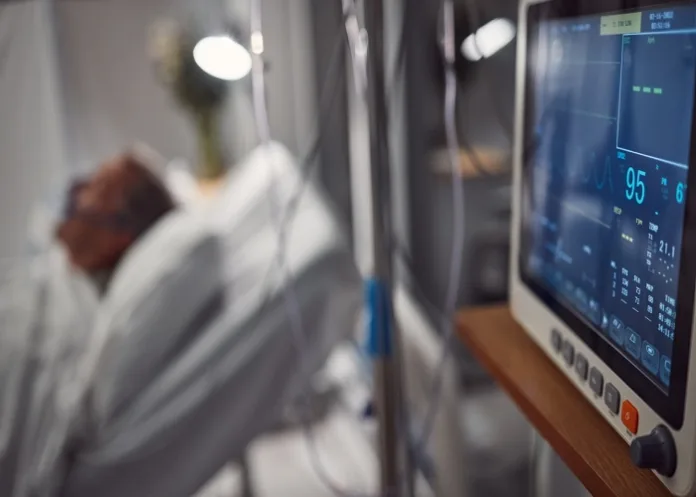Around 40% of people with brain injuries whose life support had been turned off, may have survived or at least made a partial recovery, scientists have calculated after a comparison study.
Inadequate information about the long-term outcomes of traumatic brain injury is one reason why offering an accurate prognosis can be difficult, which could lead physicians to recommend withdrawing a patient’s life support, experts have said.
This followed a comparison study of people with brain injuries whose life support was continued with those who had it turned off.
Predicting someone’s outcome from traumatic brain injury can be difficult, and some people do recover and gain at least partial independence months later. Often, reports New Scientist, families are asked to decide whether or not to withdraw life-sustaining treatment within days of a severe injury.
To learn more about the potential outcomes of such events, Yelena Bodien at Massachusetts General Hospital and her colleagues collected data on people who were on life support after a traumatic brain injury at intensive care units in the US over nearly eight years.
Of these people, 80 had life support withdrawn, and their outcomes were compared with those who continued with the treatment, some of whom went on to regain a certain level of independence.
The researchers identified factors associated with the withdrawal of life support, such as the person’s age and sex. From this, they used an algorithm to calculate their likelihood of recovery had their treatment been maintained.
These results suggest that 42% of the patients who had life support withdrawn may have survived and gained at least partial independence six to 12 months after the injury.
“Prognosis after TBI (traumatic brain injury) is highly uncertain, and expressing this uncertainty to families is very important,” said Bodien. “Our results suggest that a more cautious approach is warranted when establishing prognosis (and that) careful consideration is required when making such an irreversible decision as withdrawal of life-sustaining treatment.”
A lack of information about the long-term outcomes of this kind of injury is one reason why it is difficult to make a prognosis, she added, which may cause clinicians to assume a poor outcome was probable and therefore advise withdrawing life support.
Damian Cruse at the University of Birmingham in the UK said the results should be interpreted with some caution. “Decisions to withdraw are multi-faceted and don’t necessarily hinge on dichotomies of ‘will they be in a vegetative state or not?’, but are more about whether the level of recovery is something with which the patient would have been happy,” he said.
“That said, it is clear from this and other data that we are not as accurate in our predictions of recovery from the early period after injury as we would like to be, especially as these predictions will feed into families’ difficult choices.”
The researchers would now like to compare recovery rates after a severe traumatic brain injury among people in countries outside the US, Bodien said.
“We are also conducting studies to understand which statistical methods for imputing outcomes are most precise and could be used in future studies to estimate potential outcomes in patients who die after life support withdrawal,” she added.
Study details
Recovery Potential in Patients Who Died After Withdrawal of Life-Sustaining Treatment: A TRACK-TBI Propensity Score Analysis
William Sanders, Jason Barber, Yelena Bodien et al.
Published in Journal of Neurotrauma on 13 May 2024
Abstract
Among patients with severe traumatic brain injury (TBI), there is high prognostic uncertainty but growing evidence that recovery of independence is possible. Nevertheless, families are often asked to make decisions about withdrawal of life-sustaining treatment (WLST) within days of injury. The range of potential outcomes for patients who died after WLST (WLST+) is unknown, posing a challenge for prognostic modelling and clinical counselling. We investigated the potential for survival and recovery of independence after acute TBI in patients who died after WLST. We used Transforming Research and Clinical Knowledge in TBI (TRACK-TBI) data and propensity score matching to pair participants with WLST+ to those with a similar probability of WLST (based on demographic and clinical characteristics), but for whom life-sustaining treatment was not withdrawn (WLST−). To optimise matching, we divided the WLST− cohort into tiers (Tier 1 = 0-11%, Tier 2 = 11-27%, Tier 3 = 27-70% WLST propensity). We estimated the level of recovery that could be expected in WLST+ participants by evaluating 3-, 6-, and 12-month Glasgow Outcome Scale-Extended (GOSE) and Disability Rating Scale outcomes in matched WLST− participants. Of 90 WLST+ participants (80% male, mean [standard deviation; SD] age = 59.2 [17.9] years, median [IQR] days to WLST = 5.4 [2.2, 11.7]), 80 could be matched to WLST− participants. Of 56 WLST− participants who were followed at 6 months, 31 (55%) died. Among survivors in the overall sample and survivors in Tiers 1 and 2, more than 30% recovered at least partial independence (GOSE ≥4). In Tier 3, recovery to GOSE ≥4 occurred at 12 months, but not 6 months, post-injury. These results suggest a substantial proportion of patients with TBI and WLST may have survived and achieved at least partial independence. However, death or severe disability is a common outcome when the probability of WLST is high. While further validation is needed, our findings support a more cautious clinical approach to WLST and more complete reporting on WLST in TBI studies.
See more from MedicalBrief archives:
Severe traumatic brain injury: Don’t be too hasty in pulling the plug
Education may help in traumatic brain injury recovery
UK judge to decide on ending baby’s life support
Experts differ on when to declare a patient dead
Wrong family pulls plug on patient after hospital mix-up
UCT: Grant for under-researched field of traumatic brain injury research

